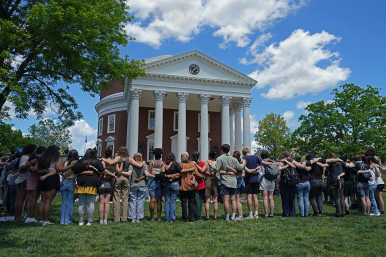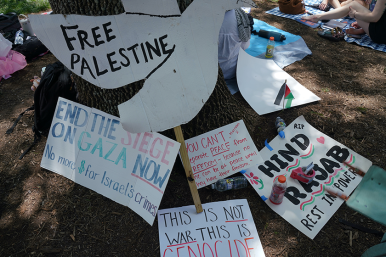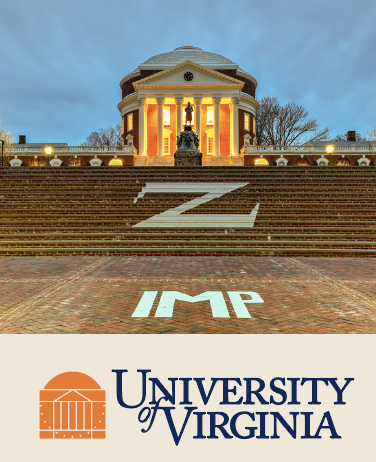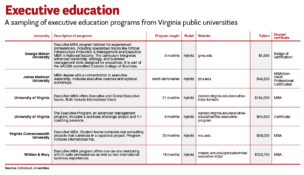Grounds for dissent?
Campus protests lead to free speech debate at U.Va.
Kate Andrews //May 30, 2024//

Police officers lift a pro-Palestinian demonstrator from the ground on the University of Virginia’s campus in Charlottesville on May 4. Photo by Cal Cary/The Daily Progress via Associated Press

Police officers lift a pro-Palestinian demonstrator from the ground on the University of Virginia’s campus in Charlottesville on May 4. Photo by Cal Cary/The Daily Progress via Associated Press
Grounds for dissent?
Campus protests lead to free speech debate at U.Va.
Kate Andrews //May 30, 2024//
On April 30, the night police raided Columbia University’s campus, arresting more than 100 protesters and keeping about 50 students and faculty members cooped up for several hours in Pulitzer Hall, where the annual journalism prizes are announced, it was pretty quiet at the University of Virginia.
According to a Cavalier Daily student reporter’s tweets April 30, about 70 people gathered near U.Va.‘s chapel with signs expressing support for Palestinian freedom and opposing Israel’s military attacks on Gaza. U.Va. Police Chief Timothy Longo stopped by and told the group that as long as no one erected tents, he didn’t have a problem with the gathering.
On the afternoon of May 4, though, police from at least three agencies arrived on U.Va.’s campus in riot gear and sprayed a few dozen protesters with chemical irritants to make them disperse, while other people watched and filmed the clash, uploading videos to social media. In the background, people chanted, “Shame on you!” Some online commenters wondered why the police didn’t show up in riot gear when white supremacists marched on campus in 2017.
According to media reports, 27 people were arrested at U.Va. on May 4. In a letter to the university later that day, President Jim Ryan wrote that the decision to bring in outside police agencies came after Longo had issued a final warning to protesters.
Among university administrators’ stated concerns was that people had erected tents without a permit — an exemption for recreational tents was removed the morning of May 4, U.Va. officials acknowledged — and that “individuals unaffiliated with the university” had joined protesters, which Ryan called a security risk.
“When [university police’s] attempts to resolve the situation were met with physical confrontation and attempted assault,” Ryan wrote, “it became necessary to rely on assistance from the Virginia State Police.”
In the days following the confrontation on the Lawn, faculty and staff in the English, history, medical and religious studies departments wrote letters critical of Ryan’s decision to involve state police, and they have been joined by multiple student organizations.
Oludamini Ogunnaike, an associate professor of African religious thought and democracy, resigned from U.Va.’s Religion, Diversity and Belonging Task Force on May 5.
“The administration had other choices but made one of the worst choices available to them: They chose violence, chaos and disorder,” Ogunnaike wrote in a letter he made public. Ryan’s statement, he added, was “misleading at best and mendacious at worst. As anyone who was actually present at the protest site could attest, the only safety concerns that day came from the police, not the protesters; there were no ‘outside agitators,’ only community members, faculty and staff who showed up out of concern for the students’ well-being.”
The May 4 arrests and police confrontation showed that U.Va. is not immune to a trend of protests this spring at college campuses across the nation, where more than 2,300 people have been arrested in connection with protests over the Israel-Hamas war in Gaza, which has claimed the lives of more than 34,000 Palestinians, mostly civilians, including nearly 7,800 children, according to the United Nations. Israel’s military action was sparked by Hamas’ Oct. 7, 2023, attack on Israeli civilians that resulted in the killings of 1,139 people, with more than 240 others taken hostage.
Student protests have also become a hot button issue on Capitol Hill and in this year’s presidential election, with legislators on both sides of the aisle and President Joe Biden decrying rising antisemitism.

“On college campuses, Jewish students [have been] blocked, harassed, attacked, while walking to class,” Biden said in a May 7 speech. “Antisemitism, antisemitic posters, slogans calling for the annihilation of Israel, the world’s only Jewish state. Too many people denying, downplaying, rationalizing, ignoring the horrors of the Holocaust and Oct. 7. … It is absolutely despicable, and it must stop.”
Some politicians — including Biden and U.S. Sen. Tim Kaine — also have emphasized that people have the right to protest so long as they are peaceful and follow local and federal laws.
Despite the May 4 arrests, U.Va. has experienced much less disruption and strife than at other universities — even in Virginia. At Virginia Tech, Virginia Commonwealth University and the University of Mary Washington, 107 people, including 68 students, were arrested at protests in late April.
And yet, there’s been so much rhetoric and prose about “wokeness” at the state’s flagship institution that a casual observer would get the impression that Mr. Jefferson’s University was a hotbed of radicalism and antisemitism.
That’s simply not the case, U.Va. students, faculty members and administrators say. And some go further, arguing that The Jefferson Council — an organization founded by conservative university alumni — and a group of university parents are working to chill free speech by those they disagree with about the Israeli war.
In late March, the underlying dispute over pro-Palestinian protests reached a new level of intensity at U.Va. as a digital billboard truck on campus ran messages calling for Rector Robert Hardie to resign, charging that he “won’t confront antisemitism” and is “unfit to lead U.Va.” It’s not clear who hired the truck, and a university spokesperson described the messages as false and offensive in a statement.
Also unclear is whether the debate over antisemitism at U.Va. is due to pro-Palestinian protests on campus or outsiders playing up allegations for their own political purposes. Either way, it’s become a major public issue for U.Va.’s administration and board.
And for a few U.Va. faculty members and one undergraduate student who were publicly named in a document accusing them of being antisemites, it has become deeply personal.
Meanwhile, the political bent of the university’s governing board of visitors is a big question on the minds of some U.Va. community members, as Republican Gov. Glenn Youngkin’s appointees are poised to make up two-thirds of U.Va.’s board in July.
A letter to the rector
This spring, the parent of a Jewish U.Va. student, writing on behalf of a few other Jewish university parents, sent a letter to Hardie criticizing the university’s approach to pro-Palestinian protests, as well as U.Va.’s statement that it was investigating the origins of the digital billboard truck.
The missive included a document listing 37 alleged incidents of on-campus antisemitism during the 2023-24 academic year — ranging from reports of anti-Jewish slurs and physical assaults on Jewish students to objections against university-sponsored speakers discussing the Israel-Palestine conflict in historical terms.
On April 4, The Jefferson Council posted an article describing the letter and linked to the 11-page document, which Executive Director James A. Bacon Jr. wrote was compiled by the parents’ group. The letter’s author, Julie Pearl, told The Daily Progress that the alleged antisemitic incidents were “observed and … [reported] by students,” but sources were not cited for some of the reports, and Bacon acknowledged to Virginia Business that he did not attempt to verify the reports before publishing.
The Jefferson Council argues that recent student demonstrations focused on the Gaza war, racial justice and LGBTQ+ rights are all part of a new wave of “wokeness,” and that this trend is quashing free speech for conservative students at U.Va.
Some of the reported incidents in the parents’ document were familiar to readers of the council’s website, which has championed the cause of Jewish U.Va. freshman Matan Goldstein, who filed a federal lawsuit on May 17 against the University of Virginia, its president and rector, and two pro-Palestinian organizations, alleging that he was “a victim of hate-based, intentional discrimination, severe harassment and abuse, and illegal retaliation” at U.Va. Goldstein was interviewed in March by The Daily Progress and CBS19 News in Charlottesville about antisemitic verbal and physical attacks he said occurred multiple times on campus, even before the Oct. 7, 2023, attack by Hamas. His attorney declined an interview request from Virginia Business on Goldstein’s behalf.
Bacon co-founded The Jefferson Council in 2020 with another U.Va. alumnus, Bert Ellis, whom Youngkin named to the U.Va. Board of Visitors in 2022. Ellis has been at the center of several ideological disputes over the past four years, starting with his attempt in September 2020 to remove a student’s sign from her Lawn room door that criticized U.Va. with a profane word. Ellis, who did not respond to requests for comment for this story, stepped down as president of The Jefferson Council when he was named to U.Va.’s board. However, his public statements as a board member and those from the council often are aligned ideologically.

Bacon was Virginia Business’ founding editor from 1986 to 2002 and in 2004 started the Virginia conservative website Bacon’s Rebellion, which takes on similar social and political controversies as The Jefferson Council.
In addition to some faculty members, one undergraduate student, Ali Jarrah, is named in the parents’ document because he emailed a few professors to promote a six-week film series focused on Israel and Palestine that was co-sponsored by U.Va.’s Jewish Studies department, Jarrah confirmed in an interview.
Two faculty members in the Jewish Studies department slated to participate at one of the six events are named in the same complaint and labeled “pro-Palestinian and antisemitic and therefore unlikely to provide a balanced view.”
Meanwhile, first-year student Goldstein alleged in a March interview with CBS19 that he has been called “a filthy Jew” and a “bloodthirsty human being” by other U.Va. students, in addition to being pushed and shoved at an October 2023 pro-Palestine protest on campus.
In April, Goldstein was investigated on U.Va. Honor Committee charges that he lied about being assaulted on campus in the CBS19 interview, according to reports by The Jefferson Council and the Foundation Against Intolerance and Racism, or FAIR, a nonprofit group started in 2020 that has opposed diversity, inclusion and antiracism initiatives.
In May, FAIR reported that the honor code probe was dropped due to lack of evidence.
An apology and correction
Also on the parents’ list was Ian Mullins, an assistant professor of sociology at U.Va. since 2019. He was listed incorrectly as having shown a video in class of the bombing of an Israeli town and voicing support for Hamas terrorists, something he did not do, Mullins says in an interview.
After contacting his department chair and others employed by the university, Mullins received an apology from the parent who compiled the list. Bacon also ran a correction about it on the Jefferson Council site, although he added that the council “disclaims any responsibility for the error.”
Despite not verifying the parents’ claims in the document or contacting the people named in it, Bacon says, “We were familiar with some of the incidents, and the incidents we were familiar with, we thought they were accurate. We just assumed that everything was accurate. That was probably, you know, a mistake on my part as the editor.”
He adds, however, that he believes everything else on the list — apart from Mullins’ inclusion and the characterization of the two Jewish Studies faculty members as “antisemitic,” which they disputed — is correct because no one has contacted him for corrections. Nevertheless, Bacon adds, “we didn’t know if there were any other issues lurking in the list, so we just took it down.”
Like Jarrah, Mullins learned about his mention on the list from someone else contacting him about it, but Mullins says he’s familiar with The Jefferson Council because a council member, Walter Smith, previously sent him Freedom of Information Act (FOIA) requests for his class syllabuses and personal text messages discussing U.Va. (Bacon confirmed the FOIA requests with Virginia Business.)
A nontenure-track sociology professor who specializes in U.S. conservative politics and its history, Mullins teaches classes on racism and the “big introductory course to sociology,” often attended by more than 100 students per class.
“So, this isn’t the first time … people associated with The Jefferson Council have targeted me,” Mullins says. “I’m also not that important at U.Va. I’m an assistant professor [who] teaches classes in sociology.” Next year, he says, he is in line to receive a promotion that will hinge on approvals of his department, the College of Arts and Sciences and, ultimately, the board of visitors. Mullins hopes the changing composition of the 17 voting members of the board — which will include 13 Youngkin appointees as of July 1 — will not affect his prospects.
“I do think, given the strength of my record, to deny me promotion will be difficult,” he says. “And if they do it, the question will be, on what grounds? I can’t be denied promotion as an act of political retaliation.”
Jarrah thinks The Jefferson Council’s post and its amplification of the parents’ list of alleged antisemitic incidents chills free speech on campus, as does Mullins, who says that because the list was sent to the university’s rector and reached U.Va.’s president, it potentially threatens the jobs of named faculty members.
Some professors, he adds, “feel like we’re one [blog] post away from being on some meme account that will bring harassment, that will bring death threats. Not everyone does everything right, but I’ve worked with a lot of people who are really committed to the students we serve.”
‘Four guys and a dog’
Meanwhile, among U.Va. board members, administrators and academic leaders, there are multiple opinions on the situation. Hardie wrote in an email to Virginia Business that he is “committed to serving the university, with which I have a long and happy history, for the full duration of my term,” which is set to end in 2025.
But Tom DePasquale, who will rotate off the board at the end of June after two terms, is steamed about the rhetoric surrounding antisemitism and Gaza protests at U.Va.
“We have some people that just aren’t being intellectually honest with what’s going on. This whole controversy revolves around a handful of people either creating it or making noise about it,” says DePasquale, calling The Jefferson Council “four guys and a dog that appointed themselves to save the university. Listen, there is not a person employed at U.Va. that wants anyone to feel unsafe. There is no chronic issue. You’re going to see that we’re talking [about] a couple of families [complaining about antisemitism on campus].”
Earlier this spring, the board of visitors discussed reports of antisemitism on campus, and Ryan privately met with a group of four Jewish parents and four students, according to news reports.
Between the start of the 2023-24 academic year and mid-April, Ryan says, the university received 26 reports “potentially related to antisemitism,” which were “thoroughly investigated.” However, neither U.Va.’s Office for Equal Opportunity and Civil Rights nor university police “identified evidence that would support additional adjudication, including disciplinary actions or criminal prosecution.”
Patricia A. “Tish” Jennings, a professor of education at U.Va.’s School of Education and Human Development who was the board’s nonvoting faculty member this year, says that what she observed this year at U.Va. was “mild” compared with her experiences at San Francisco State University several years ago. That university was sued by Jewish students who claimed it had allowed antisemitism to go unchecked.
Nevertheless, she notes, “there has definitely been an uptick of student complaints about antisemitism” at U.Va., “so that is real.”
U.Va. Center for Politics Director Larry Sabato, who witnessed a mob of tiki torch-wielding white supremacists invade the Lawn in August 2017 as they chanted “Jews will not replace us,” says that he doesn’t know what everyone on Grounds has experienced or felt during the Gaza protests — mainly because U.Va. is “a huge institution.”
However, Sabato adds, “Generally speaking, people do not appreciate others coming from outside … and suggesting that they do X, Y and Z. They just don’t like that. Universities are full of independent, headstrong people.”
It’s incorrect, many administrators and faculty members say, to assume that every Jewish student at U.Va. feels the same way about Israel’s military actions or The Jefferson Council’s views on campus protests.
In early April, the Jewish Leadership Advisory Board, a student-led group governing U.Va.’s chapter of the Hillel organization for Jewish campus life, wrote a letter to U.Va.’s board that was obtained by student newspaper The Cavalier Daily.
“We acknowledge that antisemitism is a top concern at U.Va., especially among parents, although it is not as widespread as some outside of the university community believe,” the letter says. “It saddens us to see concerted efforts to exploit Jewish students as pawns for political agendas. Such efforts threaten the safety and well-being of Jewish students.”
Asked about the students’ complaint, Bacon says, “I don’t know who’s exploiting them for political agendas … so, I’m sorry, that’s just meaningless verbiage. We have taken up the cause for Jewish students at U.Va. because it is the most prominent example of the double standards that are applied at U.Va.”
Jim Murray Jr., a former U.Va. rector and outgoing board member, says he’s observed that today’s college students are extraordinarily committed to issues they consider important, including the war in Gaza, Black Lives Matter and LGBTQ+ rights — and even going back to Vietnam War protests when he was a student.
“The same things come around and around again,” he says. “They have a different name, but the students were equally engaged. They cared deeply and strongly. They felt their lives were at stake.”
 At a glance
At a glance
Founded: Sometimes called Mr. Jefferson’s University or just The University, U.Va. was founded by Thomas Jefferson in 1819. Its first board of visitors included Jefferson and fellow U.S. Presidents James Madison and James Monroe.
Campus: With roughly 1,240 contiguous acres around its UNESCO World Heritage Site campus or “Grounds,” U.Va. is known for its distinctive Jefferson-designed Rotunda building located on the Lawn, the school’s 4.5-acre grass quad where graduations are held. U.Va.’s other major holding is the University of Virginia’s College at Wise, a four-year liberal arts college in Southwest Virginia.
2023-24 enrollment
17,618 undergraduate students
8,326 graduate students
5% international undergraduates;
19% international graduate students
35% minority enrollment
67% in-state undergraduate students
Employees
Approximately 4,900 faculty, 16,000 staff and 10,300 UVA Health staff
Academic programs
Notable for its medicine, law and business schools, U.Va. offers more than 200 majors across 12 schools.
Tuition, fees, housing and dining*
Includes average room and board, education and general fees, plus books, travel and personal expenses.
In-state residents: $39,484
Out-of-state residents: $78,214
*Note: Costs are for first-year College of Arts & Sciences students and may differ depending on year and academic program.
Sources: State Council of Higher Education for Virginia; University of Virginia



















